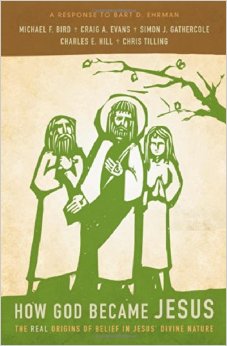 As Easter approaches, a valid question to consider is, did Jesus think he was God? If he rightly claimed to be God, Easter means something because the Resurrection means something. If he truly isn’t God and never claimed to be, the Resurrection is inconsequential at best and a fairytale at worst. Michael Bird, in his contra-Ehrman book How God Became Jesus, considers the skeptical claim that Jesus did not think he was God (and that this is clear even in his own words in the Gospels), but was only deified by his followers postmortem.
As Easter approaches, a valid question to consider is, did Jesus think he was God? If he rightly claimed to be God, Easter means something because the Resurrection means something. If he truly isn’t God and never claimed to be, the Resurrection is inconsequential at best and a fairytale at worst. Michael Bird, in his contra-Ehrman book How God Became Jesus, considers the skeptical claim that Jesus did not think he was God (and that this is clear even in his own words in the Gospels), but was only deified by his followers postmortem.
Bird quotes J. W. Bowman: “The Church cannot indefinitely continue to believe about Jesus what he did not know to be true about himself.” The point of this quote is crucial to consider, because if Jesus claimed to be God, then we are to take him on his own terms. Then, on his own terms, we can decide if he was a liar, a lunatic, or Lord (as C. S. Lewis has famously quipped). In his chapter “Did Jesus Think He Was God?”, Bird offers some helpful affirmations that Jesus did in fact think he was God (pp. 45-70):
1. Jesus places himself at the center of the Jewish hope that YHWH would return to Zion. “Jesus believed that in his own person this return was happening, God was becoming king, and the day of judgment and salvation was at hand. … [H]e acted in such a way as to identify himself with God’s own activity in the world.”
2. Jesus referred to himself as the promised Son of Man. “The sayings about a future Son of Man still make the best sense if Jesus is speaking of himself as the principal subject. … [A]t Jesus’ trial, he most likely spoke to the effect that he believed that he was the figure of Dan. 7:13-14 and that he was rightfully enthroned beside God.
3. Jesus’s deity is tied to the historical claims about him. Quoting Craig Evans, Bird summarizes, “The New Testament’s deification of Jesus Christ, as seen especially in the theologies of Paul and the fourth evangelist, has its roots in the words and activities of the historical Jesus.”
The final point is tricky because of the counter-argument that Jesus was deified by his followers against his own testimony. But again, dealing with the Scriptures that describe and reveal him, Bird helpfully points out that “John’s claim that Jesus is ‘equal with God’ (John 5:18) and ‘one with the Father’ (10:18) is simply verbalizing what is already assumed by the Synoptic Gospels, namely, that Jesus has a unique relationship with Israel’s God and Jesus possessed an authority equal to that of God.”
This clarification is an important one. Bart Ehrman, the opponent of Bird’s book, is willing to make his arguments (at least partially) from Scripture that Jesus never claimed to be God. Ehrman does concede, however, that John’s Gospel deifies Jesus rather clearly. He isn’t simply ditching the Bible as a witness about Jesus, as many skeptics do. If that’s the playing field he wants to engage on, he will continue to see legitimate rebuttals like Bird’s here. Bird shows convincingly that the Synoptics surely point to Jesus’s divinity, albeit less explicitly than John, and that this belief came from his own self-description.
It continues to baffle me that non-Christian skeptics will appeal to pre-Jesus-like figures in mythology rather than take Christianity on its own terms. For that, I commend Ehrman. Unfortunately for him, the Lion of Judah still roars from the pages of Scripture, and no post-Enlightenment cage can contain him.












